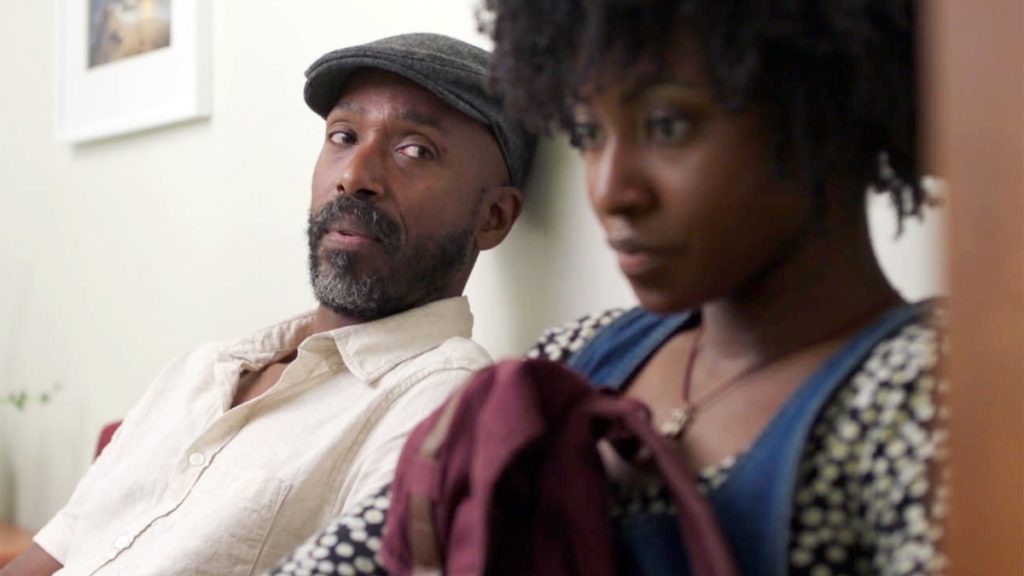The international flavour displayed at the 2020 London Film Festival was never daunting, no matter how unknown any prospective title might be. But with each tantalising journey into new and vast territories comes further cinematic and cultural education. The timid and consistently thought-provoking, Farewell Amor, was one such festival highlight.
Movies can be renowned for ending in airports, under various emotive guises, but they can also capture the heart and soul in the opening moments. Beginning with family members coming together, Farewell Amor is about transitioning between those living, breathing arrivals and departures. Which can be tricky to prepare for until you’re in the thick of it of your actual life.
Having spent 17 years apart, a family understandably feels more gratitude for their unity than ever before. In Brooklyn, New York, Walter (Ntare Guma Mbaho Mwine) has been without his family from Angola all those years, and now greets his wife, Esther (Zainab Jah), and daughter, Sylvia (Jayme Lawson), at the airport.
The reunion is not exactly awkward, but rather painfully unfamiliar. Returning to Walter’s small apartment, the three of them now have to acclimatise to these new circumstances, which many watching will not be able to comprehend.
Director, Ekwa Msangi, handles each and every poignant turn with a warm awareness. Time is taken to develop the complexities of human interaction, immigration and the changes that affect us through generations or locations. A film which so respectively echoes the Angolan and American cultures and points of view.
Farewell Amor is willing to show that as times change, the more intrinsically do people too. We can change in the blink of an eye, and might not even realise it for years. You can’t even hold human nature to blame, the paths we take and impressions we both give and receive can alter, not just perceptions, but also lose touch on what was once familiar. Happens without physical absence some times.
The film handles those cross paths with such a delicate ease, they become relatable no matter your own experiences. That said, that which is executed so seamlessly carries a weight of friction and personal conflict that in reality is not easy at all. And without gimmick or charade, Farewell Amor divides into three strands from each of the perspectives of Walter, Sylvia and Esther.
Walter’s recent memories are maintained by the physically possessions he holds as well as his drifting mind. Still very much in his thoughts is a former lover, Linda. The mother, Esther, applies routine or ritual to their reuniting, shadowing a not so deep sense of insecurity and religion. And then the daughter, Sylvia, is far more candid in her body language in that she hardly makes a sound or cracks a smile.
All three characters are shown to have underlying and masking issues and outlooks. This is what makes the three chapters so enlightening and compassionate. Each demonstrate varying discourses of concern and adapting to this new way of life.
When Walter and Sylvia visit the clinic, their father-daughter bond shows signs of blossoming until he sees his old lover and the two worlds merge awkwardly for him. The absence, of course, has created cracks in their everyday life. Walter has to readjust himself to bridging those elements of his life – as well as a better understanding of family finances or the aspirations of his daughter.
Through Sylvia’s chapter we witness a much more sprightly and vocal figure. The film’s tones sync with the characters and their woes. For Sylvia, the dancing and listening to music is a way to outsource her jitters. She is certainly the most expressive through her dance practice. Only this time, we get to see how she changes when her father enters the room.
And then, Esther, a ritually perfect choice to show her view last. One short scene has her just cleaning a part of the house. And the camera lingers long enough to ponder on how much she is distracting herself and keeping up appearances, rather than this just be merely portraying the so-called role of the woman. When Esther comes into contact with the neighbour, she is more interested in finding out information about the large chunk of Walter’s life she has missed over the years.
Writer-director, Ekwa Msangi, crafts a patient, intrusively captivating film. Weaving together the complex outlooks of Walter, Esther and Sylvia, suggesting that perhaps the direction they’ve been going, or are going, is in fact more suited to them as things stand. Msangi so consciously captures the vibes and tensions of others, that we can’t always hide what we think are clandestine thoughts. Especially with those that know how we tick.
The three performances central to Farewell Amor – Ntare Guma Mbaho Mwine, Zainab Jah, Jayme Lawson – are flawlessly affecting in their own ways. Seeing Esther speak of her life on the phone as if it is all coming together, while those tears down her cheeks claim it is not, is heart-breaking. And yet the sullen faces make the rare glint in the eyes all the more cherished.
Farewell Amor goes a long way in depicting the sort of pain that comes from love and longing. Walter and Esther’s dance in the restaurant is when his efforts pay off and her wall lowers. The passion and release in all three of them rekindles something of their kinship.
Walter, Esther and Sylvia have to confront their fears, be frank and somehow become stronger as a result. Of course, that final dance recognition for Sylvia soars deeper than the act of dance itself. And the closing moments of the three family members immersed in regular home life speaks volumes for their cause.

